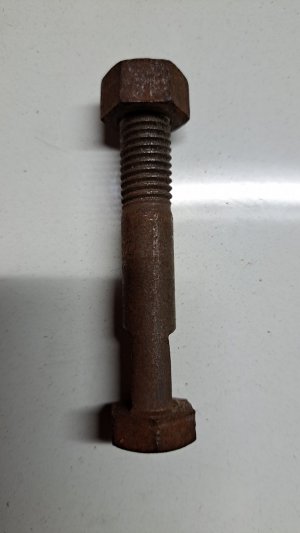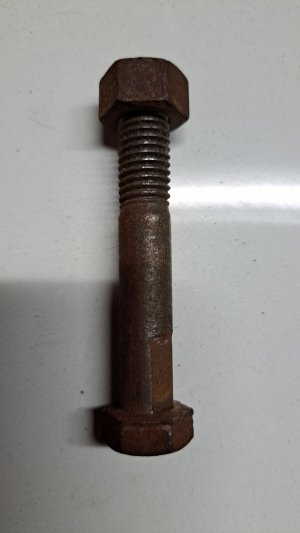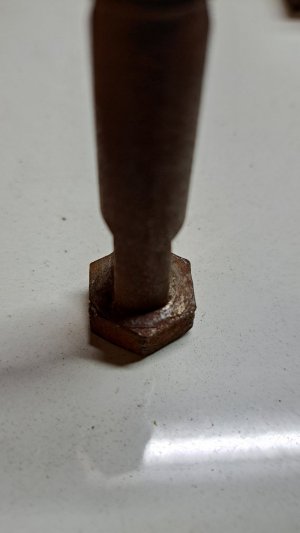-
Welcome back Guest! Did you know you can mentor other members here at H-M? If not, please check out our Relaunch of Hobby Machinist Mentoring Program!
You are using an out of date browser. It may not display this or other websites correctly.
You should upgrade or use an alternative browser.
You should upgrade or use an alternative browser.
T slot bolts
- Thread starter snoopdog
- Start date
- Joined
- Aug 23, 2014
- Messages
- 222
You can, I have, but there's plenty to be mindful of when doing so.
Stretching/deforming and then possibly hardening of the bolt can cause the overhanging section of the slot to deform and even break.
Make sure they fit properly and inspect closely before and after, certainly not for heavy duty machining regardless of what they are holding, vise/toe clamp/jig or fixture. Or the workplace itself.
Failure of a bolt midway through the job is a sight to see.
The incident I saw was actually a proper t slot bolt that failed.
Vise in the bin along with the job and the milling cutter and arbor.
Few days checking and testing the mill, the chipped t slots we had repaired with metal spray.
Stretching/deforming and then possibly hardening of the bolt can cause the overhanging section of the slot to deform and even break.
Make sure they fit properly and inspect closely before and after, certainly not for heavy duty machining regardless of what they are holding, vise/toe clamp/jig or fixture. Or the workplace itself.
Failure of a bolt midway through the job is a sight to see.
The incident I saw was actually a proper t slot bolt that failed.
Vise in the bin along with the job and the milling cutter and arbor.
Few days checking and testing the mill, the chipped t slots we had repaired with metal spray.
Attachments
Last edited:
- Joined
- Dec 27, 2021
- Messages
- 740
Thanks, certainly don't need a catastrophic failure.You can, I have, but there's plenty to be mindful of when doing so.
Stretching/deforming and then possibly hardening of the bolt can cause the overhanging section of the slot to deform and even break.
Make sure they fit properly and inspect closely before and after, certainly not for heavy duty machining regardless of what they are holding, vise/toe clamp/jig or fixture. Or the workplace itself.
Failure of a bolt midway through the job is a sight to see.
The incident I saw was actually a proper t slot bolt that failed.
Vise in the bin along with the job and the milling cutter and arbor.
Few days checking and testing the mill, the chipped t slots we had repaired with metal spray.
- Joined
- Apr 30, 2015
- Messages
- 12,261
That must have been a bad one to ruin a vise and the job and the cutter and damage the mill table-holy smokes
- Joined
- Feb 13, 2017
- Messages
- 2,138
For an Atlas horizontal mill, I have used some older (new old stock) 3/8 square headed bolts for clamps. With a few caveats. . . First, I do light work on softer metal, usually non-ferrous. Then the machine is small, but very well made. The bolts are not hardware store stock, they are from an industrial supplier locally. There aren't any grade markings, but they seem to be closer to Gr. 5 than hardware store stock. The bolts are "black iron", I guess a form of steel. They are threaded full length, not just the tips.
Interestingly, the heads of the bolts fit the slots of the Atlas very well as is. And the heads leave a little space below when drawn up. Many times the bolts have been trimmed (cut) and the threads dressed to allow for tight tolerances. I have several "jobs" where the stock is fastened directly to the table. They are not used very often, but when I do, they hold well enough.
I have a "set" of "T" nuts, studs, and nuts. They work well enough and get used for most applications. But occasionally I run into tight quarters where the parts are just too large. I have had "ex spurts" advise against using bolts, but sometimes you do what you gotta do.
.
Interestingly, the heads of the bolts fit the slots of the Atlas very well as is. And the heads leave a little space below when drawn up. Many times the bolts have been trimmed (cut) and the threads dressed to allow for tight tolerances. I have several "jobs" where the stock is fastened directly to the table. They are not used very often, but when I do, they hold well enough.
I have a "set" of "T" nuts, studs, and nuts. They work well enough and get used for most applications. But occasionally I run into tight quarters where the parts are just too large. I have had "ex spurts" advise against using bolts, but sometimes you do what you gotta do.
.
- Joined
- Jan 25, 2015
- Messages
- 2,558
I have, but it was only as a “getcha through” for a quick job so I could make proper t-nuts.
make a t nut, ditch a bolt. Make another, ditch the second bolt. Then I was up and running with the proper (Ie safe and stable) set up and able to make a fistful of t nuts for future clamping needs.
make a t nut, ditch a bolt. Make another, ditch the second bolt. Then I was up and running with the proper (Ie safe and stable) set up and able to make a fistful of t nuts for future clamping needs.
- Joined
- Feb 21, 2022
- Messages
- 849
My Bridgeport has tee slots 16mm wide at the top ( 5/8" ).
I always use M16 high tensile tee bolts - nuts and hardened thick washers.
Stronger than the M14 found in standard 16mm tee nuts.
An M16 high tensile hex head bolt is 24mm A/F.
An M14 tee nut - for 16mm tee slot is 25mm square.
I would prefer an M16 high tensile bolt over a home made M14 tee nut and allthread.
I always use M16 high tensile tee bolts - nuts and hardened thick washers.
Stronger than the M14 found in standard 16mm tee nuts.
An M16 high tensile hex head bolt is 24mm A/F.
An M14 tee nut - for 16mm tee slot is 25mm square.
I would prefer an M16 high tensile bolt over a home made M14 tee nut and allthread.



